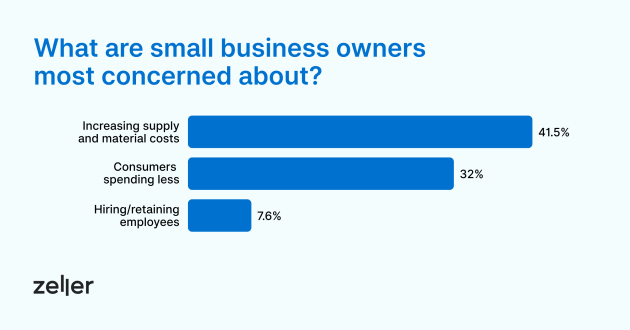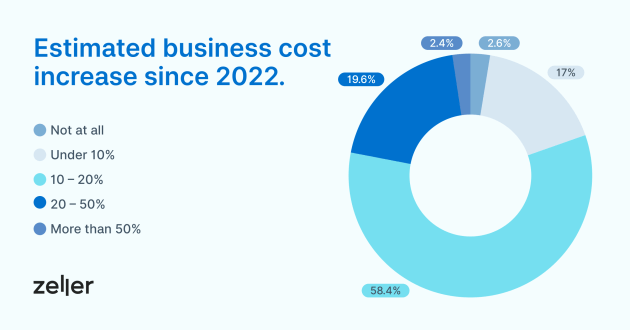Australian fintech company Zeller says its inaugural Small Business Resilience Report reveals 80 per cent of the 601 companies surveyed reported supply costs increasing more than 10 per cent in the past year. With 85 per cent of small businesses looking at cost-cutting measures, urgent innovative solutions to support growth are needed, the fintech said.
Zeller was founded by Ben Pfisterer and Dominic Yap in 2020 and provides businesses with integrated tools to accept payments, manage finances, and pay recipients faster.
Zeller director of growth, Joshua McNicol, said, “We’re arming business owners with real-time data from their business payments and spending to make smarter decisions to manage their business through the crunch.”

Key data from the report
Biggest factors impacting small businesses today
- 42 per cent said the increasing cost of supplies and materials; and
- 32 per cent said reduced consumer spending.

Increasing supply costs
- 80 per cent of small business owners estimated supply costs had increased 10 per cent in the last year; and
- one in five reported increases between 20-50 per cent.
Impact of inflation
- 67 per cent raised concerns over inflation and rising interest rates negatively impacting consumer spending.
Staff shortages easing
- 64 per cent of businesses said it was easier to recruit new staff today than it was 12 months ago.
- hiring skilled employees and retaining good staff was the third highest concern for businesses, albeit at 7.6 per cent, 24.4 per cent behind the second concern of reduced consumer spending.
Cost cutting a top priority
- 85 per cent of small business owners are actively looking for ways to cut costs with many using tactics such as renegotiating supplier contracts or surcharging EFTPOS fees; and
- more than one in two transactions processed with a Zeller EFTPOS Terminal in May included a surcharge, up 104 per cent compared to the same month last year.

McNicol said, “Our report reveals the impact a challenging economic environment is having on small business owners – but we’re encouraged to see adversity breeding opportunity.
“Australian small business owners demonstrate a rare breed of determination in adapting and identifying solutions to sustain their businesses through tough times.”
One such method was to look out for purchasing trends. “Take note of customer behaviour within your business by paying attention to the types of products they are purchasing, their reactions to prices, and any signs of hesitation or affordability concerns. Offering a special deal is a great way of gauging whether your customers are looking to cut their spending,” the report said.
Not all customers are the “average Australian”, Zeller said. “Australia is a country of 26 million people, living across vastly different social and geographical landscapes. So, while the data showed that average Australians are reducing spending, individuals will respond to the cost-of-living pressures in different ways depending upon their own unique set of circumstances. By understanding your customers, you can gauge these circumstances before adjusting your strategy.”
Managing business finances (6.3 per cent), keeping up with technology (3.5 per cent), keeping up with regulations and reporting (3 per cent), and cybersecurity (2.6 per cent) are also on the radar for business, as are customers choosing to buy sustainably (1.6 per cent).
Malcolm McCullough, owner of Bill’s Farm at Melbourne’s Queen Victoria Market, said the system has helped his business understand its cash flow and financial position.
“We look at our Zeller Dashboard frequently to gain a real-time snapshot of all of the funds coming into our business from EFTPOS and going out through expenses and spending. We use this information to forecast and measure our success according to our budget; having this information in one place means we can always keep track of business performance and react to changes,” McCullough said.
With 35 years’ experience, he added, “There’s only three ways you can increase sales, either you get more customers and you sell the same, you sell more to the same amount of customers, or you put your prices up. They’re the only three ways”.






